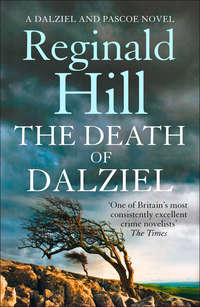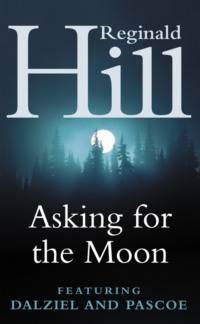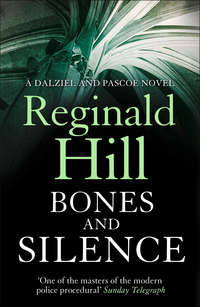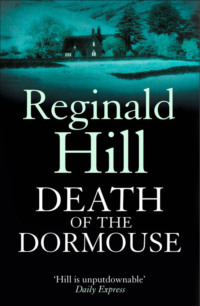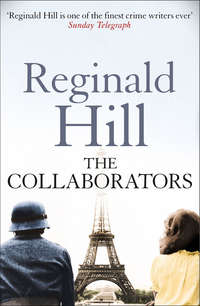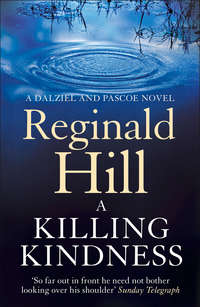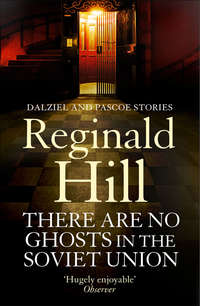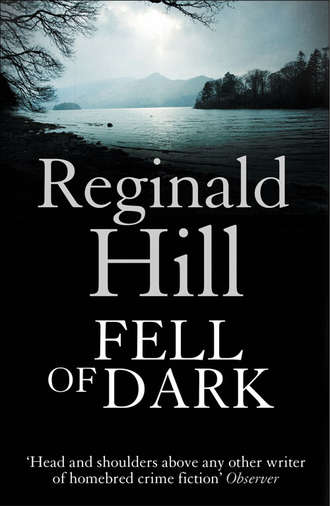
Полная версия
Fell of Dark
‘Aren’t you coming too, Harry?’ asked Peter appealingly. I could see signs of strain on his face like those which had seemed permanently etched there during the first weeks after his breakdown.
‘Mr Bentink will come with me,’ said Melton politely but firmly. ‘We’ll get things done much more quickly that way. We don’t want to keep you hanging about, do we?’
He turned away, but Peter still stood in the doorway, his hand tightening on the jamb till his knuckles whitened.
‘I don’t see how we can help anyway,’ he said in a high, strained voice, looking straight at me. ‘We only saw the girls once, in the hotel bar. We never saw them again.’
His gaze fixed on me for a few moments longer, then he turned into the room and the door closed behind him.
I stood in bewilderment. What Peter meant by his last comment seemed clear enough to me. He wanted me to enter into conspiracy with him to conceal our second meeting with the girls. But why should he want this? Why?
‘Come along, please, Mr Bentink,’ said Melton. ‘Let’s see if we can find somewhere to stow ourselves.’
He led the way further down the corridor and stopped at the last door.
‘Here we are. This will do, I think.’
He opened the door and waved me in. I stepped forward, then stopped dead. Sitting there reading a large type-written sheet was Ferguson. He looked up.
‘Hello, Bentink,’ he said.
‘How on earth did you get here?’ I asked.
He grinned.
‘Our policemen are wonderful,’ he said.
‘I am sorry,’ said Melton. ‘Come along, Mr Bentink. We must obviously look further afield.’
We turned the corner at the end of the corridor and went up a flight of stairs. Up here we were obviously on a different plane of existence. There was a carpet on the floor, not luxurious but sufficient, and the room he finally took me into was very different from the bare functional boxes I had had a glimpse of below. Again, it was not luxurious, but it was reasonably spacious and the emulsioned walls looked bright and fresh. The furniture just consisted of a large desk and three or four chairs, but even these looked solid and reasonably expensive compared with the flimsy hardboard affairs below. And the room’s biggest advantage was that it had a real window. I went to it and peered out. The rain was slackening off a bit it seemed and visibility had improved, but it was hard to believe in the brilliant sunshine of the previous day.
Melton had come to stand beside me and he seemed to catch the tail-end of my thought and take it further.
‘If it had been like this yesterday, those girls might still be alive.’
We stood in silence after that looking out on the rain-washed landscape.
The police station was a fairly new building situated on the outskirts of the town and it backed on to some open fields which stretched away to the near fell-slopes. As I looked up at the dimly discernible heights, I felt I could imagine all kinds of sinister and dreadful happenings taking place there, but not what had happened the day before. That seemed somehow too urban, native to those stretches of heath or parkland which pass for the countryside near large towns rather than this wilderness whose terrors were not made by man.
‘Shall we proceed now, Mr Bentink?’
I shook off my mood of abstraction and took the proffered chair. Melton smiled at me, placed the fingertips of his hands carefully against one another and stared down at the resulting pinnacle.
‘Now, Mr Bentink,’ he said. ‘What can you tell me about the deaths of Miss Olga Lindstrom and Miss Sarah Herbert?’
‘Absolutely nothing,’ I said.
There was a long pause. I began to feel rather embarrassed for Melton, who was waggling his fingers around now as if rather uncertain how to go on.
Finally he took a deep breath and spoke.
‘Obviously I did not get you to come all this way, at considerable expense to the taxpayer, just so that you could tell me absolutely nothing.’
‘Obviously,’ I agreed.
‘Then why did I fetch you?’ he asked.
‘You tell me,’ I said.
‘No,’ he said. ‘You tell me. You did come, after all. Voluntarily. Why did you come?’
‘Why, to help you with your enquiries.’ I cursed myself for mouthing the well-worn phrase. He smiled.
‘And did you feel you could help?’
‘No,’ I began, but was quickly interrupted.
‘Then I am indeed grateful that you’ve come all this way despite your conviction that your journey was useless. That was very good of you.’
I began to grow angry.
‘Look, Superintendent, if you want to translate cooperation with the police as a confession of guilt, that’s your business.’
Again he interrupted me.
‘Forgive me, Mr Bentink. I was just interested to know if there was anything relevant to the case which you felt you yourself would like to mention. That’s all. We don’t encourage amateur detectives but the ideas of intelligent men, especially those who have been on the spot at important times, are never ignored by us. I’m sorry you feel suspicious of my motives. All I want is information. All the information. All the little bits you might have stored away, quite unknown to your conscious mind. I set no traps. I just want to help you remember.’
‘Remember what?’
‘If I knew that, I would not need to trouble you any further. Perhaps a little confirmation to start with. You are Henry Aldgate Bentink of Flat 67, Montagu House, W.C.I?’
‘Yes.’
‘Splendid. It’s not often that people are so precise or legible in their entries in hotel registers.’
‘A mark in my favour?’
‘It depends where in your scale of values you put precision and legibility, Mr Bentink. You are at present on a walking holiday with Peter Charles Thorne, you arrived at the Derwent Hotel last Monday evening and stayed there till Wednesday, that is yesterday morning?’
‘Yes.’
‘Why?’
‘Why what?’
‘Why did you stay there till yesterday morning, rather than, say, this morning? Or tomorrow morning?’
I did not understand his motives for this line of questioning and this worried me. What on earth could the length of our stay at the Derwent have to do with the case? I decided to be as unforthcoming as I could till he had revealed his hand.
‘No reason in particular.’
Melton stood up and took a turn round the room.
‘Mr Bentink, I take it you are an intelligent man, probably a University man.’
‘Yes.’
‘One of the penalties of intelligence is the difficulty of simulating unintelligence. It is so incongruous. Why will you not attempt to be frank with me? Either it was part of your overall holiday plan or it was an improvisation, a whim, a decision taken at the hotel. Whatever it was, there was a reason. No one suggests it was a sinister reason. Ninety-nine per cent of the people I talk to look for sinister reasons for all my questions when there are usually none. I know what it feels like. But let me repeat, I set no traps.’
He sat down again and looked at me almost pleadingly. I began to feel more at home, not because I believed a word of his protestation, but because this was a kind of tablemanship I was used to. Much of my working day was spent in just such confrontations and I mentally reviewed the list of preliminary self-questionings which I had learnt almost literally at my father’s knee. The main question was usually whether to attack or defend. Or rather, when to attack.
Well, I did not know Melton well enough yet to decide who was stronger, but I felt reluctant to commit myself to the truth. I gather that this is a not uncommon phenomenon in criminal cases and perhaps the reason is what I felt on that day. I felt myself somehow threatened and the truth was a final and impregnable bastion of defence. I did not wish to come to it too soon. Do not think I felt any serious concern for myself. The crime was a dreadful one, but I had nothing to do with it. And I was rational enough to recognize my own irrationality. And also my one real reason for holding the superintendent at arm’s length. This was my ignorance of what Peter was saying downstairs. He had implied that he was going to claim we had only seen the girls once, very briefly, in the hotel bar. Why?
‘Well, Mr Bentink. The hotel,’ he said gently.
He must know why we left when we did. He must have talked to Stirling and everyone else at the hotel. Questions about guests, time of alibis, recent departures.
I could not see any harm in his knowing, or anyone’s knowing, as long as Peter was telling it too. And there was no reason why he should not be.
‘We decided to leave yesterday morning because we thought we’d head across to the coast and spend some of this fine weather by the sea. We had decided this the previous night, but there was an unfortunate incident during the night which, though it did not make up our minds for us, certainly prevented us from changing them. But that can have no bearing on the case.’
‘I gather Mr Stirling was not amused.’
‘You knew,’ I said accusingly.
‘Ah yes. But you knew I knew. What interests me is why you bothered to work it out. Do you often get as drunk as that, Mr Bentink?’
‘Not often.’
‘Had you been celebrating anything special?’
‘No.’
‘I see.’
The stress was on the ‘I’. He took off his spectacles and rubbed them on his sleeve. Then put them back on and looked at an open file which lay on the desk before him. What the hell could he need time to think about, I wondered.
‘It was during this celebration that you exchanged words with the deceased girls, I believe. Would you tell me about that.’
‘It was nothing really. I just asked them if they were coming back to their seats or leaving. They didn’t reply, just jabbered away to each other in Swedish, then off they went.’
‘Nothing else?’
‘No.’
‘Do you speak Swedish? Could you understand what they said?’
‘No. No.’
‘But you knew it was Swedish?’
‘Well no. It sounded vaguely Scandinavian, if you know what I mean. And they looked Swedish.’
‘I see. Did you see them again?’
This was the crunch. I postponed the moment of positive decision by attempting to imply rather than state outright that I had not seen them ever again.
‘They left immediately and to the best of my knowledge never came near the hotel again.’
I thought I had got away with it, then cursed him as, appearing to want something to say rather than an answer, he repeated, ‘So you never saw them again.’
‘No,’ I mumbled.
My reasoning was simple. Peter wanted to be kept out of this business so much that he was prepared to lie about it. If he felt so strongly, it did not matter what the reason was. In fact, the less important the reason, the more important it seemed to support him. The doctor had said he was not ready for the kind of emotional pressure the recent past had put him under. This day had brought other pressures just as powerful to a mending mind. He felt himself threatened without reason, but the lack of reason could not be explained to him until his mind recognized the lack of threat. The sooner we got away from there the better.
I am not of the cast of mind which automatically puts personal loyalties before the public good. I am not quite sure what I would do it I discovered a close friend was a spy or a criminal. But in this instance I saw things fairly clearly. Nothing I could tell Melton about our meeting with the girls around midday could possibly throw any light on what happened to them six or seven hours later.
And in the back of my mind was the smug thought that in fact to be found out in this lie would almost redound to my credit.
But I still didn’t really like it, and muttered my ‘no’, and was heartily glad when the superintendent seemed satisfied.
‘Who else was in the bar that evening, Mr Bentink?’
‘I don’t know any names, I’m afraid. You see we’d only been there a day and spent most of that time out on the fells so there wasn’t much time to get to know people.’
I realized I was becoming garrulous in my efforts to display my eagerness to help, and I took a deep breath.
‘There were a lot of people I’d seen in the dining-room. A fat middle-aged woman with a thin grey man. I can’t be more exact. He was just grey.’
He smiled and sorted out a bit of paper.
‘Mr and Mrs Mannering. I have them here.’
‘And there was a family – two teenage sons and their parents.’
‘The Fosters.’
I screwed my eyes up in the effort to recall.
‘There was a party of walkers, young lads, probably from the hostel. I remember a very blond boy.’
‘Ah yes. The Wyrton Boys’ Club party. We have them here.’
‘The manager. Stirling, wasn’t it? I think he poked his head in.’
‘Hardly a very startling intrusion, I shouldn’t have thought.’
‘Oh. Well, that’s about my limit I’m afraid.’
‘Really? That’s not very good, is it? I mean you said the place was absolutely crowded, so crowded that the only way to get a seat was to nip in sharply as soon as anyone showed signs of leaving.’
‘I’m sorry.’
He stood up.
‘Think a bit more. Some other faces might come back, I know that memory’s a very odd thing. Would you excuse me a moment?’
He went out. I heard his footsteps recede down the corridor and wondered where he had gone. I toyed with images of two-way mirrors and secret peep-holes through which he could peer to see if I started rifling his desk as soon as he left. The thought amused me so I smiled and wondered what he would make of my smile. But it faded away as I thought that most probably he had gone to see how Inspector Copley was getting on with Peter. But in the end I shrugged that away too and smiled again at the thought that he had very likely just gone to the loo. He looked the kind of nervous little man whose bowels might be affected by the tension of such a responsibility as his.
But I had other things to think of, besides Melton’s character, though perhaps his character played a large part in the answer to the number one question which was, why had we been brought here? The more I thought about it, the more uneasy I became, though I could not see any possible reason for uneasiness, apart from the lie about our second meeting. But that lie did not exist when we had been summoned.
It had been this discussion of the crowded bar which had suddenly brought it home forcibly to me how many people were involved. A hotelful and a hostelful, plus any casuals who had been around. The superintendent could hardly have interviewed all these. Could hardly intend interviewing all these. His men would take statements. He would sift through the statements and … he would want to see some people personally. But why us? Why not statements first from us?
Perhaps we were mentioned in other statements and his interest had been roused. Perhaps Stirling had indicated us as suspicious characters. The bastard! I felt I had arrived at part of the answer.
But the time factor still worried me. It was only 11:30 now. We had caught the 10 a.m. train from Boot. And had been met at 10:25. How long had Melton been on the case? There was an urgency here I did not like.
But what suspicion could attach itself to us? Could it be that Melton did not know where we had been the previous evening? But he must have checked with the Boot Inn to have been able to have Armstrong and Lazonby waiting for us at Ravenglass.
I told myself I was being too subtle about the whole thing. It probably did boil down to a matter of character in the end. Melton, nervous little Melton, must have the kind of quirk which demanded that he should put himself in personal contact with everyone on the case. Perhaps he could not delegate. Probably that was why he had had to leave me. He wanted to check up on his underlings, to see what was going on.
He would be downstairs in one of the little boxes talking perhaps to Peter.
The thought did not altogether please. But it was followed by another which pleased even less.
Or to Ferguson.
What was Ferguson’s part in all this? Why was he here? The only obvious connection he had with the case was not with the girls, but with us. With Peter and myself.
His presence was now the most puzzling feature of all. But at least, I thought, whatever he said must be proof positive that we were securely ensconced in the Boot Inn the night before.
I smiled and lit a cigarette. The door opened and Melton came back in.
He sat down.
‘Which route did you take yesterday morning?’
‘We went down through Borrowdale and then on through Seathwaite, over Esk Hause and down into Eskdale.’
‘Sounds like a stroll in the park when you say it like that.’ He smiled.
‘It didn’t feel like it.’
‘Hot were you, then?’
‘That’s right.’
‘See many people around?’
‘One or two, I suppose there were a lot around, it was such a lovely day. But there’s a lot of fellside up there.’
‘Did you notice anyone you knew?’
I thought for a long time. The trouble with telling a lie you don’t really want to tell (which rarely happens in business) is that you feel the same distaste every time you tell it, not just the first.
‘We saw the party of lads from the hostel. The ones in the hotel bar.’
‘That’s all?’
‘Yes.’
Again I was forced into the lie positive.
There was a tap on the door and a young constable came in with two cups of coffee on a tray. He placed them on the desk and went out without a glance at me. But I felt he was making a great effort to avoid staring.
‘Sugar?’ asked Melton.
We sat looking at each other over the tray as we manoeuvred the implements from one to another, for all the world like two housewives taking a break from shopping.
Always pick your moment for taking the initiative very carefully, my father had told me. This seemed like it, but even as I began to speak I had a feeling that the moment had been picked for me.
‘Mr Melton,’ I said as I took a sip of the cloudy brown liquid in my cup, ‘why, when you must have an incredible amount of work to do, are you spending so much time on someone who can help you as little as I can, who only met the girls for the briefest of moments’ (the distaste again) ‘and who can by no stretch of the imagination be suspect. Please don’t be offended by my bluntness, but I find it curious.’
He smiled.
‘Well, it’s better than being told one should be out catching criminals instead of manning radar traps. But you underestimate your value to us, Mr Bentink. That’s what makes police work so difficult. People don’t know how much they can help. It’s a kind of modesty, I suppose. But something you said there interested me, Mr Bentink. Of course you’re not here as a suspect, except insofar as anyone remotely connected with the case is a suspect. But why are you so certain of your own exemption from suspicion?’
Again I found myself not altogether liking his phraseology, but I could afford to be benevolent.
‘Because, as you must know, Superintendent, I was visibly in the Boot Inn from six-thirty p.m. on.’
He raised his eyebrows.
‘Indeed we do know that, Mr Bentink. But I fear you are labouring under a misconception of some kind. When do you think the girls died?’
‘Between seven and ten, didn’t they?’
‘Who told you that?’
‘Why, Detective-Constable Lazonby, I think it was. He implied it anyway.’
‘You must have misinterpreted him. Or he himself is misinformed.’
The fingers were now back in the steeple formation. The eyes fixed firmly on me.
‘The pathologist’s preliminary examination indicates the girls had been dead between eleven and fourteen hours when found. They were found at three a.m. That means, as I am sure you can work out, that they died – were murdered – between one o’clock and four o’clock yesterday afternoon. And you were on the fells then, Mr Bentink. So it’s not quite such an imaginative stretch after all.’
SIX
I held the coffee cup steady at my lips for as long as I decently could and cursed the slowness of my wits. I had seen men lose fortunes on the market like this. Not fully understanding what was going on, they had clung all the more tightly to their certainties, only to sink completely when these were snatched away.
Suddenly, from being in possession of a perfect abili, I had been turned adrift on the mountainside with no one except Peter able to vouch for a single second of a single one of the three vital hours. I pulled myself up mentally. There were doubtless hundreds of people in a similar position. The area must have been swarming with walkers on a day like yesterday, I thought. Lone walkers; walkers in pairs, in threes, in fours; groups of walkers, packs of walkers, columns, battalions and regiments of walkers.
‘That surprises me, Superintendent,’ I said easily. ‘How could such a thing happen in broad daylight on such a popular stretch of the fells?’
He looked down at his papers as though at notes. But though I had seen him toy with a pencil for a few seconds at a time, he never appeared to write anything.
‘You say you only saw one group of people yourself, Mr Bentink. That must have been in seven or eight hours up there.’
‘There were others in the distance.’
‘Who may or may not have seen you and almost certainly woudln’t if you sat down. Or lay down. Or were made to lie down.’
‘But noise. Screams. On a clear day.’
‘Muffled by something. A sweater. A jacket. And pressure round the throat. The rape and strangulation were apparently almost simultaneous.’
I felt ill.
‘But what kind of people … in broad daylight … The risk!’
Melton stood up and looked out through the rain-spattered window.
‘What kind of people? No special kind. At least not special in that they are going to stand out to a casual glance. Hotblooded enough to make them ignore the risk. But coldblooded enough I suspect to make them aware how little it was. This was no prolonged passionate love-making, Mr Bentink. This was a one-minute job. And then they lay there panting hard. And the girls not panting at all. All in sixty seconds.’
I sat unable to speak, or smoke, or sip coffee.
He went on.
‘Then they got up. Dragged the bodies ten, fifteen yards to a shallow gully, a dried-up stream bed. And tipped them in. No attempt was made to cover them. They just tipped them in. No one saw anything then, though as you say there were hundreds of people out walking that day. And no one came across the bodies till one of the search party found them early in the morning. No one in the hostel worried till locking-up time. Even then, they did not really start worrying. It was the finest day in living memory. The night was warm and clear. No one could be in trouble on a night like this, everyone thought. But at midnight they started wondering, at twelve-thirty they started worrying. At one they started searching. Two hours later, they found them. Quite easy, really.’
‘How long have you been here?’
‘They woke me up at four-thirty.’
He turned round and yawned. I looked at my watch. It was midday.
‘We’ve done a lot since then.’
I decided the time had come to really test the situation.
‘I’m sure you must be very tired and still extremely busy. Do you want me to make any kind of statement? If so, I’ll get on with it. It won’t take long – I mean, there’s not a great deal I can state. But I mustn’t keep you back from the job.’
He looked as if he hadn’t heard a word.
‘Mr Bentink, are you married?’
‘Yes.’
‘And Mr Thorne. Is he married?’
‘No.’
‘Have you been on holiday together before?’
‘Well, yes. When we were undergraduates.’
‘You met at University?’
‘Yes.’


